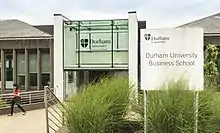Durham University Business School
Durham University Business School is the business school of Durham University and is located in Durham, England.[1] Established in 1965, it holds triple accreditation (AACSB, AMBA and EQUIS).[2] It is currently ranked between 7th and 67th in the world for its MBA and MSc programmes by the Financial Times, The Economist and the Expansión. The Global MBA is currently ranked 43rd in the world by the Financial Times.
| Motto | Leading Business Thinking |
|---|---|
| Type | Business School |
| Established | 1965 |
| Dean | Susan Hart |
| Students | 2,500 |
| Location | , England 54°45′51″N 1°35′10″W |
| Affiliations | AACSB, AMBA & EQUIS |
| Website | http://www.dur.ac.uk/business/ |
 | |
The University's Department of Economics and Finance and the Foundation for Small and Medium Enterprise Development merged with the business school in 2002 to become the School of Economics, Finance and Business, more commonly known as Durham University Business School.
Accreditations
The university holds full UK degree-awarding powers which are audited by the UK's Quality Assurance Agency for Higher Education.[3][4] Additional recognition for courses in the business school is provided by accreditation with several organisations at the national and international level, such as the Association to Advance Collegiate Schools of Business of the United States – AACSB, the European Quality Improvement System in Europe – EQUIS, and the Association of Masters of Business Administration of the United Kingdom – AMBA.[5]
Rankings and reputation
In 2020, the Financial Times ranked the Online MBA 7th in the world[6] and the Global MBA 63rd in the world.[7] Also in 2020, the pre-experience Masters in Finance was ranked 49th in the world[8] and the Master's in Management 63rd in the world.[9]
The Economist ranked the MBA 37th overall (2th in the UK) in 2021 in a global list of schools which excluded six of the nine UK schools ranked by the Financial Times. The ranking placed Durham University Business School ahead of Nottingham University Business School.[10] The Economist ranked Durham University's Master's in Management 27th in the world in 2017.[11]
The Durham Global MBA was also placed 11th in the world and 5th in the UK by the 2015 QS Distance Online MBA Rankings,[12] while the Executive MBA was ranked 49th in the world by the 2013 Economist EMBA Ranking.[13]
- Expansión– Mexico's leading business magazine – ranked the full-time MBA 63rd internationally[14] in 2018 and the Executive MBA 48th in 2017.[15]
- The Wall Street Journal Accelerated MBA Rankings, which lists the Top 15 Schools, ranked Durham University Business School 14th in the world and 2nd in the UK in 2009. The rankings placed Durham University Business School ahead of Oxford Business School and Cambridge Business School.[16]
- Ranked 15th in the world in Top Business Schools Internationally Known by EDUNIVERSAL's International Scientific Committee in 2008.[17]
Courses
Durham University Business School provides courses at undergraduate and postgraduate levels. Undergraduate courses include Bachelor's degrees in the fields of economics, finance, business, marketing and accounting. Postgraduate degrees are offered in management, marketing, finance and economics, including MBA, MA, MSc, DBA and PhD. Courses are offered in full-time, part-time and distance learning formats.
Research

Durham University Business School has more than 200 research students. In the 2008 Research Assessment Exercise, 95 per cent of the Business and Management Studies research at Durham University was assessed as being at least of International Quality (2* and above) in terms of originality, significance and rigour.[18] This positions the school 19th in a total of 90 schools within the business and management sector (based on the Grade Point Average score) in Great Britain.[19] In the last external assessment of teaching quality by the QAA, which reviewed economics and finance, the school was awarded a maximum score of 24/24.
The school's research centres and groups are diverse and extend across geographical and cultural boundaries.
Visiting academics – past and present – include:
- Guangjing Cao, chairman of the China Three Gorges Project Corporation (CTGPC) on the Yangtze River.[20]
- Glenn Carroll Stanford University and Columbia University, specialist on Population Ecology[21]
- Jack Cohen, specialist in complexity and chaos theory[22]
- Kenneth Davies, senior economist and head of global relations, OECD.[23]
- Werner De Bondt DePaul University, specialist in behavioural finance[24]
- John Doukas Old Dominion University specialist in mergers & acquisitions, and asset price anomalies[25]
- Robin Gilchrist, vice president, Alcatel-Lucent[26]
- David Gravells, former chairman of the Association of MBAs of United Kingdom[27]
- David Greatbatch, former academic of Oxford University and XEROX Research Laboratory, Cambridge[28]
- Chris Greensted, associate director (quality services) of EQUIS[29]
- Mike Hannan Stanford University, specialist on population ecology[30]
- Sir Roger Jackling, KCB, CBE, former head of The Defence Academy of the United Kingdom[31]
- Gregory Koutmos Fairfield University specialist in asset pricing and volatility[32]
- Ehud Lehrer, Bar Ilan University, specialist on game theory;[33]
- Grigor McClelland, former director of Manchester Business School[34]
- Bill McKelvey, professor of strategic organizing and complexity theory at the UCLA Anderson School of Management[35]
- Ray Rist, adviser, World Bank, Washington D.C.[36]
Affiliates
The business school has extensive links with companies, organisations and academic institutions. In particular the business school is engaged in research with:
- The Institute of Chartered Accountants in England and Wales (ICAEW)
- The Association of Chartered Certified Accountants (ACCA)
- Chartered Institute of Management Accountants (CIMA)
- British Accounting and Finance Association (BAFA)
The school's academic network includes:[37]
- Central University of Finance and Economics, Beijing, China
- Fudan University, Shanghai, China
- Sun Yat-Sen University, Guangzhou, China
- Euromed Marseille Ecole de Management, Marseille, France
- Aix-Marseille University, Marseille, France
- EBS University of Business and Law, Germany
- University of Mannheim, Germany
- WHU – Otto Beisheim School of Management, Germany
- University of Hong Kong, Hong Kong
- University of Pisa, Italy
- University of Trento, Italy
- University of Udine, Italy
- University of Tokyo, Japan
- BI Norwegian School of Management, Norway
- Financial University under the Government of the Russian Federation, Moscow, Russia
- Institute of Business Studies (IBS-Moscow),[38] Russian Presidential Academy of National Economy and Public Administration, Russia
- Lund University, Sweden
- University of Stellenbosch, South Africa
- Korea University, Seoul, South Korea
Notable alumni
The school has around 25,000 alumni from over 150 countries worldwide.[39] The following individuals are alumni (listed by first name order and qualifications with year of graduation if known)
- Andrew Thorburn, MBA (Distinction), CEO of the National Australia Bank and former CEO of Bank of New Zealand[40]
- Anwar Choudhury, MBA, British High Commissioner to Bangladesh
- Barry Rowland, MBA (1997), Chief Executive of the Falkland Islands[41]
- James Averdieck, BA in economics (1988), founder and former managing director of Gü[42]
- Rupert Hoogewerf, BA in Chinese with Japonese (1993), founder and Chairman of Hurun Report[43]
- John Vane, 11th Baron Barnard, MSc (1987), British peer and landowner
- Kerryann Ifill, MBA, president of the Senate, Barbados
- Nigel Phillips, MBA (1997) Governor of the Falkland Islands[44]
- Norman Lacy, MSc, Minister for Educational Services and Minister for the Arts, Government of Victoria, Australia
- Paul Madden, MBA (2002), British High Commissioner to Australia[45]
- Will Greenwood, BA in Economics (1994), English rugby union player in the 1990s and 2000s[46]
Honorary doctorates
- Joseph Stiglitz DCL – recipient of the Nobel Memorial Prize in Economic Sciences (2001) and the John Bates Clark Medal (1979)[47] – honorary doctor of Durham University Business School
Plagiarism incident
In January 2002 Professor Tony Antoniou was appointed as the sixth dean of the business school.[48] He was suspended in October 2007 after allegations of plagiarism.[49] In March 2008 Antoniou was dismissed by the university for misconduct.[50]
References
- "The 2008 Rankings of the Best Business Schools in the world. University of Durham – Durham Business School". EDUNIVERSAL. Archived from the original on 21 December 2008. Retrieved 17 April 2009.
- "Triple Accreditation Crown for Durham Business School". Durham Business School. Retrieved 17 April 2009.
- "University of Durham". Register of HE providers. HEFCE. Retrieved 12 September 2017.
- "University of Durham". Reviews and Reports. Quality Assurance Agency. Retrieved 12 September 2017.
- "Calibre and Heritage". Durham University Business School. Retrieved 12 September 2017.
- "Durham University Business School – Online MBA Ranking 2020". Financial Times. Retrieved 25 January 2021.
- "Durham University Business School – Global MBA Ranking 2020". Financial Times. Retrieved 25 January 2021.
- "Durham University Business School – Masters in Finance Pre-experience 2020". Financial Times. Retrieved 25 January 20219. Check date values in:
|access-date=(help) - "Durham University Business School – Masters in Management 2020". Financial Times. Retrieved 25 January 2021.
- "Full Time MBA ranking". The Economist. Retrieved 25 January 2021.
- "Masters in Management". The Economist. 10 May 2017. Retrieved 12 September 2017.
- "QS Distance Online MBA Rankings". The QS. Retrieved 4 October 2015.
- "Economist EMBA Ranking". The Financial Times. 18 July 2013. Retrieved 5 October 2013.
- "Las mejores escuelas y universidades del mundo en programas de tiempo completo". Expansión (in Spanish). Retrieved 25 January 2021.
- "Los mejores másters ejecutivos en administración de negocios". Expansión (in Spanish). Retrieved 12 September 2017.
- "One-Year M.B.A. Programs". The Wall Street Journal. 16 September 2009. Retrieved 25 November 2014.
- "The 2008 Rankings of the Best Business Schools in the UK". EDUNIVERSAL. Archived from the original on 22 April 2009. Retrieved 17 April 2009.
- "RAE 2008 Results for Durham University Business School". Retrieved 18 April 2009.
- "RAE08 Ranking of UK Universities in Business and Management Studies". The Guardian. London. 18 December 2008. Retrieved 18 April 2009.
- "Prof. Cao source". Retrieved 18 March 2012.
- "Prof. Carroll source". Archived from the original on 29 May 2012. Retrieved 27 March 2012.
- "Prof. Cohen source". Retrieved 18 March 2012.
- "Prof. Davies source". Retrieved 18 March 2012.
- "Prof. De Bondt source". Retrieved 27 March 2012.
- "Prof. Doukas source" (PDF). Archived from the original (PDF) on 16 June 2010. Retrieved 27 March 2012.
- "Prof. Gilchrist source". Retrieved 18 March 2012.
- "Prof. Gravells source". Retrieved 18 March 2012.
- "Prof. Greatbatch source". Retrieved 18 March 2012.
- "Prof. Greensted source". Retrieved 18 March 2012.
- "Prof. Hannan source" (PDF). Archived from the original (PDF) on 13 August 2011. Retrieved 27 March 2012.
- "Prof. Jackling source". Retrieved 18 March 2012.
- "Prof. Koutmos source". Retrieved 27 March 2012.
- "Prof. Lehrer source". Retrieved 27 March 2012.
- "Prof. McClelland source". Retrieved 18 March 2012.
- "Prof. McKelvey source". Retrieved 18 March 2012.
- "Prof. Rist source". Retrieved 18 March 2012.
- "Durham University Business School – Durham University". www.dur.ac.uk.
- "International Partnerships | Postgraduate". Eng.ibs-m.ru. Archived from the original on 8 July 2012. Retrieved 3 July 2012.
- "Why Durham Business School?". Durham Business School. Retrieved 17 April 2009.
- "Kiwi boss". Bnz.co.nz. Retrieved 3 July 2012.
- "Rowland, Barry Alan, (born 9 Aug. 1961), Chief Executive, Falkland Islands Government". UK Who's Who. doi:10.1093/ww/9780199540884.001.0001/ww-9780199540884-e-253940. Retrieved 4 October 2018.
- "Annual Conference 2010 Speakers". Marketing-society.org.uk. Archived from the original on 1 April 2012. Retrieved 3 July 2012.
- "Hurun Report".
- "Phillips, Nigel James, (born 1963), Governor, Falkland Islands". UK Who's Who. doi:10.1093/ww/9780199540884.001.0001/ww-9780199540884-e-277858. Retrieved 4 October 2018.
- "Paul Madden FCO". Ukinaustralia.fco.gov.uk. Archived from the original on 22 March 2012. Retrieved 3 July 2012.
- Interview by Hester Lacey (2 September 2011). "The Inventory: Will Greenwood". FT.com. Retrieved 3 July 2012.
- "Durham University Business School – Durham University". www.dur.ac.uk.
- "Durham University Business School : Milestones - Durham University". www.dur.ac.uk. Retrieved 4 August 2018.
- MacLeod, Donald (30 October 2007). "Durham dean suspended for plagiarism". The Guardian. Retrieved 4 August 2018.
- "Shamed academic fired by business school". York Press. Retrieved 4 August 2018.
